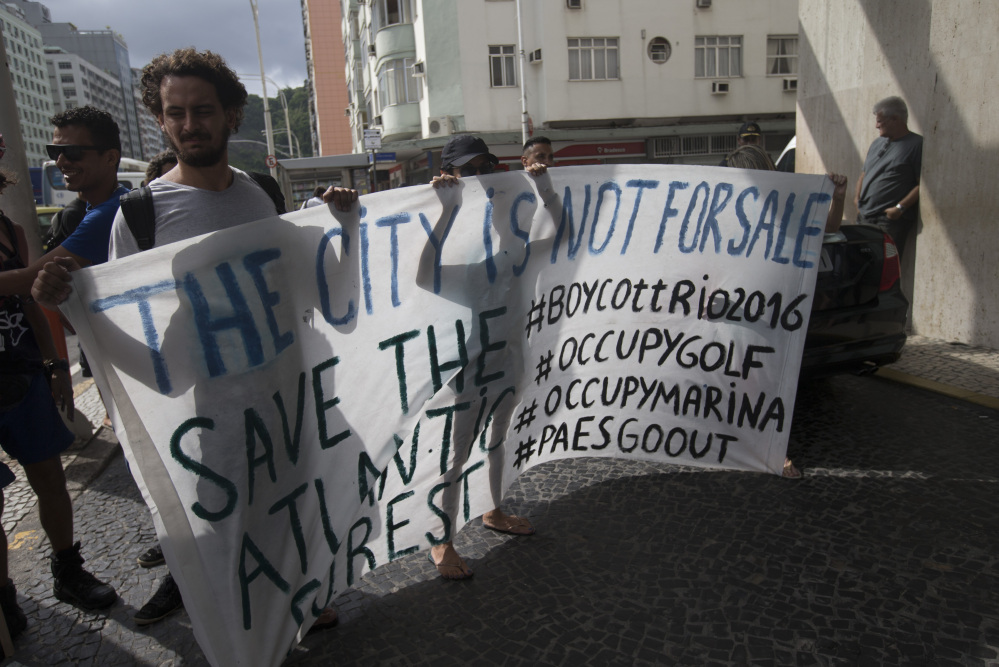RIO DE JANEIRO — Environmental activists burst into the lobby of a luxury hotel on Rio’s Copacabana Beach where IOC officials were meeting Saturday, protesting against ecological destruction related to the 2016 Rio Olympics.
Security guards tried to hem in the small group of activists, but at least two women managed to push their way into the hotel as IOC President Thomas Bach was chairing a meeting of his executive board on another floor.
One of the activists, who grabbed a five-ring Olympic flag and tried to wave it, shouted about destruction of a nature preserve in western Rio where the Olympic golf course is being built. She also screamed about continued delays in cleaning up the city’s polluted waterways.
She blew on a whistle as security guards tried to restrain her. Other protesters outside the hotel held banners, including one saying “Ecological Holocaust. IOC go home.” Another banner read: “Thomas Bach is a nature killer!”
The scene was witnessed by dozens of journalists from around the world waiting for the start of a news conference by Bach.
Jean Carlos Novaes, who eventually reached the hotel lobby, said he represented the environmental group “Golf for Whom.” Other protesters said they represented a group called “Occupy Golf” and “Occupy Marina da Gloria,” the venue for Olympic sailing.
“We are not against the Olympics, but we are against the corruption around the golf course that is being arranged by the mayor (Rio Mayor Eduardo Paes),” Novaes said. “They are stealing with the Olympics as an excuse.”
Paes has been a strong ally of the IOC and lauded for helping to organize the games. A public prosecutor is also considering a lawsuit against him for granting alleged concessions to the billionaire developer of the golf course where 140 luxury apartments are being built with prices in the $2-7 million range.
Bach, speaking afterward and peppered with questions about the environmental impact on several venues and delays in cleaning up Rio’s waterways, insisted without the games – nothing would be done.
“All of this without the games would not have happened,” Bach said. “So again, it’s clear evidence what a positive legacy these games are leaving in the infrastructure, the social and in the environmental areas.”
Minutes after the protest started, about a dozen police formed a smaller line just outside the hotel door.
“We hope the foreign journalists inside will wake up over this, to know what is going on in our city,” said Thiago Schuina, 31, who said he worked as a geologist.
Mark Adams, the head of communications for the IOC, came down to the hotel lobby and talked through an interpreter for several minutes with the whistle-blowing protester, who identified herself only as Sandra. She said she was a teacher.
“We’re not against the Olympic games,” she repeated. “This is about the golf course. We have two golf courses. We don’t need a third.”
Adams repeated several times: “We have to agree to disagree,” as he listened to the woman. He offered to be in contact with her.
“There are a lot of lies going on,” she said calmly as Adams spoke. “I do believe the games themselves will improve the quality of life for the vast majority of people.”
The woman jumped in.
“If you preserve the city, yes,” she said. “But this is not what’s going on. You cut down 300 trees that are 100 years old in an area that was a cultural heritage. That’s a crime.”
Rio is spending about $14 billion for the Olympics – a mix of private and public money. Brazil spent $12 billion on last year’s World Cup, expenditures that are looming larger as Brazil teeters on the brink of recession with the local currency having lost 35 percent of its value in the last few months.
Send questions/comments to the editors.



Comments are no longer available on this story